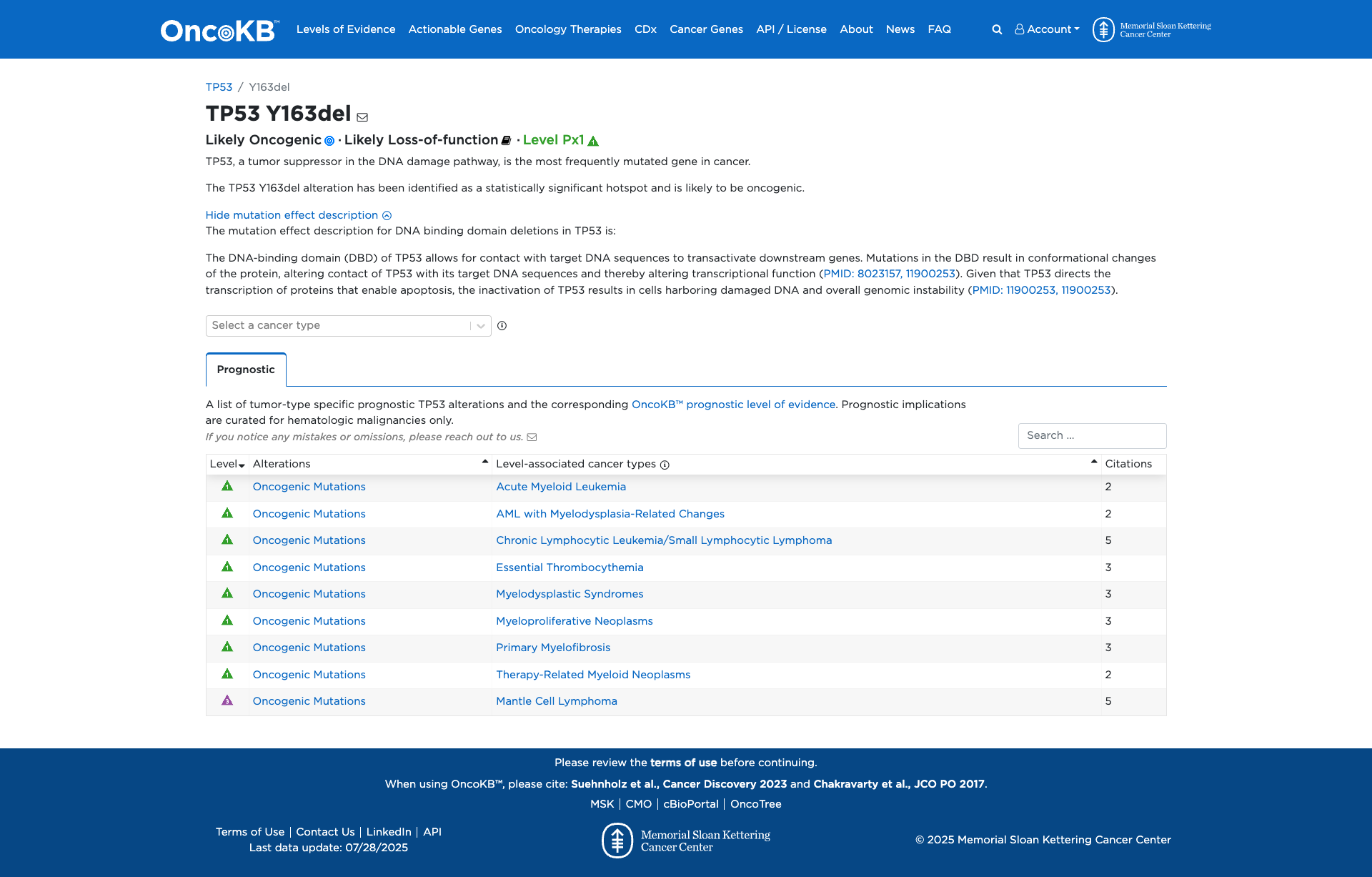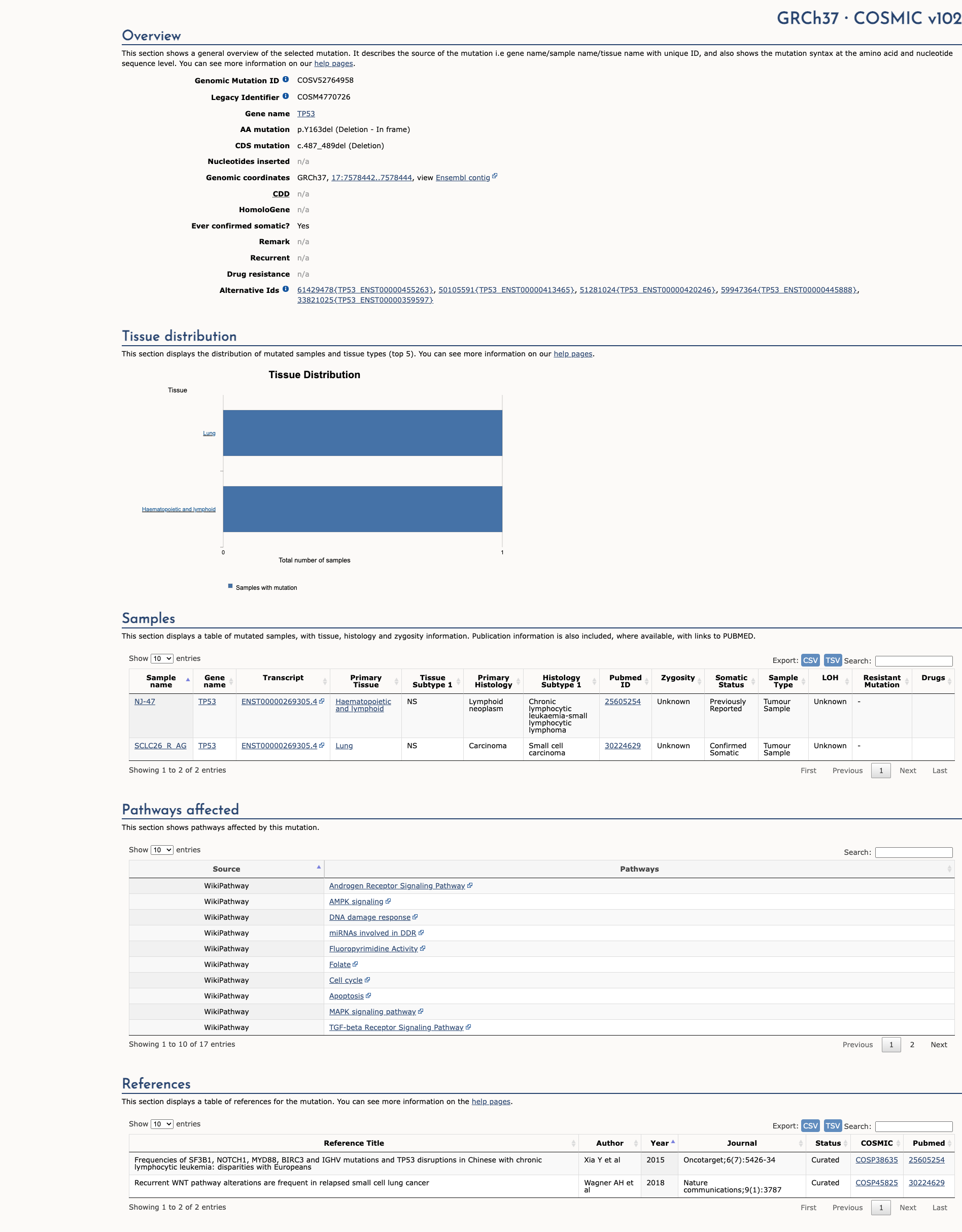TP53 c.487_489del, p.Tyr163del
NM_000546.6:c.487_489del
COSMIC ID: COSM4770726, COSM7444022
Likely Pathogenic
The TP53 Y163del variant is classified as Likely Pathogenic based on strong functional evidence (PS3), a moderate protein‐length change (PM4), supporting absence from population databases (PM2), and supporting computational evidence of no benign impact (BP4).
ACMG/AMP Criteria Applied
PS3
PM2
PM4
BP4
Genetic Information
Gene & Transcript Details
Gene
TP53
Transcript
NM_000546.6
MANE Select
Total Exons
11
Strand
Reverse (−)
Reference Sequence
NC_000017.10
Alternative Transcripts
| ID | Status | Details |
|---|---|---|
| NM_000546.5 | RefSeq Select | 11 exons | Reverse |
| NM_000546.3 | Alternative | 11 exons | Reverse |
| NM_000546.4 | Alternative | 11 exons | Reverse |
| NM_000546.2 | Alternative | 11 exons | Reverse |
Variant Details
HGVS Notation
NM_000546.6:c.487_489del
Protein Change
Y163del
Location
Exon 5
(Exon 5 of 11)
5'Exon Structure (11 total)3'
Functional Consequence
Loss of Function
Related Variants
Alternate Identifiers
COSM4770726, COSM7444022
Variant interpretation based on transcript NM_000546.6
Genome Browser
Loading genome browser...
HGVS InputNM_000546:c.487_489del
Active Tracks
ConservationRefSeqClinVargnomAD
Navigation tips: Use mouse to drag and zoom. Click on features for details.
Clinical Data
Population Frequency
Global Frequency
0.0 in 100,000
Extremely Rare
Global: 0.0%
0%
0.05%
0.1%
1%
5%
10%+
ACMG Criteria Applied
PM2
This variant is not present in gnomAD (PM2 criteria applies).
Classification
Unknown
Publications (0)
No publication details.
Clinical Statement
Functional Impact
Functional Domain
Hotspot Status
Hotspot
PM1
Mutation Count
1326
Reported mutations in this domain
050100+
Domain Summary
This variant is located in a mutational hotspot or critical domain (1326 mutations).
PM1 criterion applied.
Related Variants in This Domain
Functional Summary
The TP53 Y163del variant has been functionally characterized as likely to result in loss of function. This alteration occurs in the DNA-binding domain of TP53, leading to conformational changes that impair the protein's ability to bind target DNA sequences and transactivate downstream genes. Consequently, this disruption affects TP53's role in directing the transcription of proteins involved in apoptosis, contributing to genomic instability and oncogenesis.
Database Previews
OncoKB

JAX-CKB

Click on previews to view full database entries. External databases may require institutional access.
Computational Analysis
Pathogenicity Predictions
Predictor Consensus
Unknown
PP3 Applied
No
VCEP Guidelines
Applied ACMG/AMP Criteria (VCEP Specific) VCEP Guidelines
PVS1
PVS1 (Not Applied) Strength Modified
According to VCEP guidelines, PVS1 applies only to null variants (nonsense, frameshift, canonical splice, deletions causing NMD or targeting critical domains). This variant is a single amino acid in-frame deletion (Y163del), not predicted to cause NMD or canonical splice alteration. Therefore, PVS1 is not applied.
PS1
PS1 (Not Applied) Strength Modified
According to VCEP guidelines, PS1 applies when a variant results in the same amino acid change as a known pathogenic variant. No such variant at codon Y163 has been reported. Therefore, PS1 is not applied.
PS2
PS2 (Not Applied) Strength Modified
According to VCEP guidelines, PS2 requires confirmed de novo occurrence with maternity and paternity. There are no de novo data for this variant. Therefore, PS2 is not applied.
PS3
PS3 (Strong)
According to standard ACMG guidelines, PS3: "Well-established in vitro or in vivo functional studies supportive of a damaging effect on the gene or gene product." The TP53 Y163del variant has been functionally characterized as causing loss of function in the DNA‐binding domain with impaired transactivation. Therefore, PS3 is applied at Strong strength.
PS4
PS4 (Not Applied) Strength Modified
According to VCEP guidelines, PS4 requires case-control or proband count points. No case or proband data are available. Therefore, PS4 is not applied.
PM1
PM1 (Not Applied) Strength Modified
According to VCEP guidelines, PM1 Moderate applies to missense variants at hotspot codons 175, 245, 248, 249, 273, or 282. Codon 163 is not among these. Therefore, PM1 is not applied.
PM2
PM2 (Supporting) Strength Modified
According to VCEP guidelines, PM2 Supporting: allele frequency <0.00003 in gnomAD. The Y163del variant is absent from gnomAD and other population databases. Therefore, PM2 is applied at Supporting strength.
PM3
PM3 (Not Applied) Strength Modified
According to standard ACMG guidelines, PM3 applies to recessive disorders when detected in trans with a pathogenic variant. TP53 Y163del is associated with dominant cancer predisposition and no trans data exist. Therefore, PM3 is not applied.
PM4
PM4 (Moderate)
According to standard ACMG guidelines, PM4: "Protein length changes due to in-frame deletions/insertions in a non-repeat region are moderate evidence of pathogenicity." This single amino acid deletion alters the protein length within the DNA-binding domain. Therefore, PM4 is applied at Moderate strength.
PM5
PM5 (Not Applied) Strength Modified
According to VCEP guidelines, PM5 applies to missense variants at a residue with previously observed pathogenic missense variants. Y163del is an in-frame deletion, not a missense change, and no missense pathogenic data exist at this residue. Therefore, PM5 is not applied.
PM6
PM6 (Not Applied) Strength Modified
According to VCEP guidelines, PM6 is for assumed de novo occurrences without confirmation. No de novo data are available. Therefore, PM6 is not applied.
PP1
PP1 (Not Applied) Strength Modified
According to VCEP guidelines, PP1 requires segregation data. No family segregation information is available. Therefore, PP1 is not applied.
PP2
PP2 (Not Applied) Strength Modified
According to standard ACMG guidelines, PP2 applies to missense variants in genes where only missense changes cause disease. TP53 disease mechanism includes loss-of-function variants of multiple types. Therefore, PP2 is not applied.
PP3
PP3 (Not Applied) Strength Modified
According to VCEP guidelines, PP3 for single amino acid in-frame deletions requires BayesDel ≥0.16 and SpliceAI <0.2. BayesDel scores are unavailable; although SpliceAI is low, computational data are insufficient. Therefore, PP3 is not applied.
PP4
PP4 (Not Applied) Strength Modified
According to standard ACMG guidelines, PP4 requires a specific phenotype or family history. No phenotype data are provided. Therefore, PP4 is not applied.
PP5
PP5 (Not Applied) Strength Modified
According to standard ACMG guidelines, PP5 applies to assertions from reputable sources without evidence. No such assertions exist. Therefore, PP5 is not applied.
BA1
BA1 (Not Applied) Strength Modified
According to VCEP guidelines, BA1 requires a filtering allele frequency ≥0.001. The variant is absent from population databases. Therefore, BA1 is not applied.
BS1
BS1 (Not Applied) Strength Modified
According to VCEP guidelines, BS1 requires a filtering allele frequency ≥0.0003 and <0.001. The variant is absent. Therefore, BS1 is not applied.
BS2
BS2 (Not Applied) Strength Modified
According to VCEP guidelines, BS2 requires unaffected older females data. No such data are available. Therefore, BS2 is not applied.
BS3
BS3 (Not Applied) Strength Modified
According to VCEP guidelines, BS3 requires functional studies showing no loss of function. Functional evidence shows loss of function. Therefore, BS3 is not applied.
BS4
BS4 (Not Applied) Strength Modified
According to VCEP guidelines, BS4 requires lack of segregation in affected family members. No segregation data are available. Therefore, BS4 is not applied.
BP1
BP1 (Not Applied) Strength Modified
According to standard ACMG guidelines, BP1 applies to missense variants in genes where only truncating variants cause disease. TP53 disease mechanism includes multiple variant types. Therefore, BP1 is not applied.
BP2
BP2 (Not Applied) Strength Modified
According to standard ACMG guidelines, BP2 applies when a variant is observed in trans with a pathogenic variant in a dominant disorder. Not applicable. Therefore, BP2 is not applied.
BP3
BP3 (Not Applied) Strength Modified
According to standard ACMG guidelines, BP3 applies to in-frame indels in repetitive regions. This region is not repetitive. Therefore, BP3 is not applied.
BP4
BP4 (Supporting)
According to VCEP guidelines, BP4 Supporting for single amino acid in-frame deletions: BayesDel <0.16 and SpliceAI <0.2. SpliceAI score is 0.02 and computational evidence suggests no splice impact. Therefore, BP4 is applied at Supporting strength.
BP5
BP5 (Not Applied) Strength Modified
According to standard ACMG guidelines, BP5 applies when variant is found in cis with a pathogenic variant. No such observation exists. Therefore, BP5 is not applied.
BP6
BP6 (Not Applied) Strength Modified
According to standard ACMG guidelines, BP6 applies to assertions from reputable sources without evidence. None exist. Therefore, BP6 is not applied.
BP7
BP7 (Not Applied) Strength Modified
According to VCEP guidelines, BP7 applies only to synonymous or intronic variants outside splice motifs. Not applicable to an in-frame deletion. Therefore, BP7 is not applied.

